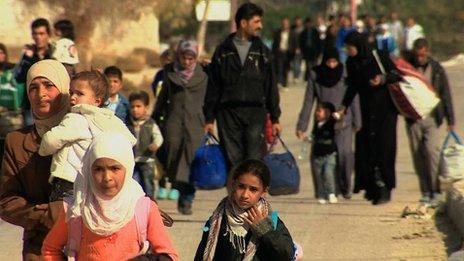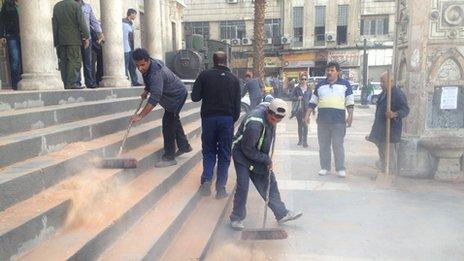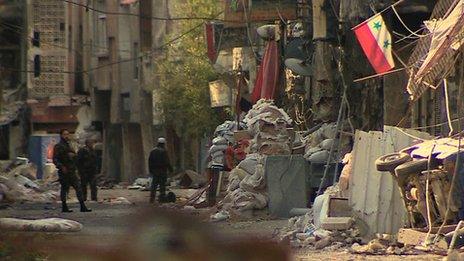Syrians grow numb to pain of war as conditions get worse
- Published

The authorities allowed nearly 2,000 people to leave the area of Moadamiya, sealed off since March
It's the kind of restaurant you'd find in chic neighbourhoods in many capitals - all glass and steel and white faux leather chairs. It was still warm enough to sit outside, so we did. An old Elton John song wafted through the evening air over the hubbub of conversation sprinkled with laughter.
Then, suddenly, the soundtrack was shattered. At first it struck like a roll of thunder, but it was soon clear there was a crescendo of gunfire along the next street. I looked around. No one seemed to take much notice. But then, it continued.
A few people stood up, uncertain what to do. Some went inside the restaurant. A few young men in jeans ran to the street to investigate. I looked through the wall of glass to the tables just inside. One woman with an elegant white head scarf sat with her fork suspended in mid-air. Another man waited, his cigar held aloft.
Then the young men returned. "What was it?" I asked. "Maiat - a dead person," they said as they hurried back to their table. "Who died?" I asked again. "A soldier, a martyr." Guns were being fired in the air to mark his death. Not long after, the restaurant's sound system burst into an Arabic rendition of Happy Birthday and a cake with flickering candles was paraded in. "See," my Syrian friend said. "They're numb, numb to the war around them. How," he asked, "can they celebrate a birthday when every day is now a day of death?"

The Hijaz railway station took a direct hit in the past week
At the table next to the birthday party, a few old men played cards while others dined. "People go out to a restaurant like this and play cards in the middle of dinner?" I asked. "Yes", he said. "Those who can still afford it, do it - to escape."
Citadel hit
Trying to escape from this life is what more and more people are doing these days in Damascus. But less than 10 miles (16km) from this restaurant, many can't escape. Neighbourhoods in the suburbs of the capital are under siege. A few days earlier, we witnessed a partial evacuation as nearly 2,000 people were allowed to leave the area of Moadamiya, sealed off since March.
"We didn't eat bread for nine months," one woman told me, her hands trembling as a tide of people fled down the road toward waiting buses. "We ate leaves and grass."
These are suburbs controlled by rebel fighters who accuse the government of trying to starve them into submission. You can even see that slogan - "surrender or starve" - on some army checkpoints. But the government accuses the rebels - "terrorists" they call them - of holding people hostage. It's civilians who are suffering, badly.
I asked my dinner companion, a government supporter, whether most Syrians knew what was happening not far away, or had they stopped listening to the news? "They know," he said, "but in Syria now, there is very bad, bad, and not so bad." "And," he added "what seemed bad yesterday, doesn't seem that way today." In other words, as this war drags on, it gets worse. And it descends to a level no one here would ever have imagined.

Many parts of Damascus bear the scars of a long conflict
For some, the only way to make it through the day is to find ways to shut it out. Syrians are still showing their famed hospitality, extending aid to neighbours and strangers. But this war is now putting pressure on almost everyone. And every time I come back to Damascus, the crisis is different.
This time, there's still a constant crump from government artillery firing into the suburbs. But now more mortar shells have started landing inside the city centre. The government blames the rebels but no one takes responsibility. In the past week, the fabled Hijaz railway station and the ancient citadel of Damascus both took direct hits. The damage was limited, but the impact cuts much deeper than the stone. War is now reaching the very heart of this city and its precious heritage.
A year ago, Syrians mourned when the Old City of Aleppo to the north became the focus of heavy fighting. Treasured sites now lie in ruins. "Do you fear it could happen here?" I asked an archaeologist as we inspected the damage to the Citadel of Damascus. He paused, with a long sigh. "I hope not, I hope not," he said... and then, even words escaped him.